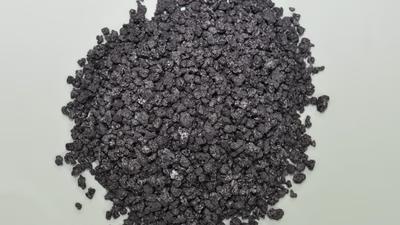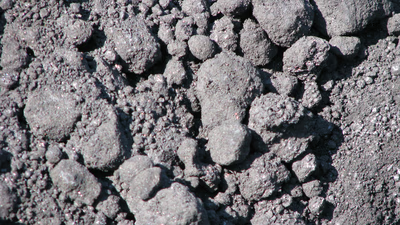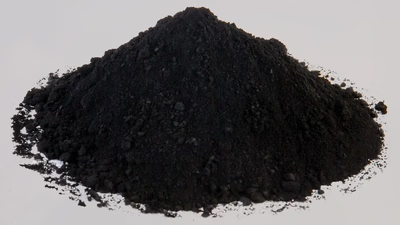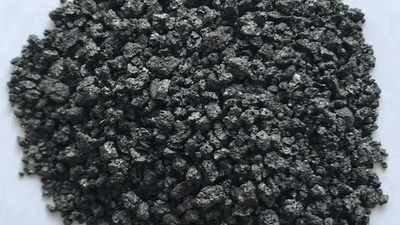
Petroleum coke: A vital component in energy and manufacturing.
Petroleum coke has a high carbon content, typically ranging from 85% to 95%. This makes it an excellent source of carbon for industries that require carbon-rich materials such as steelmaking, aluminum smelting, and the production of carbon and graphite-based products. Petroleum coke has a high calorific value, meaning it releases a significant amount of heat energy when burned. This makes it an efficient fuel source for power generation, cement kilns, and other industrial processes that require high heat. Calcined petroleum coke, in particular, has excellent electrical conductivity due to its carbon content. This makes it an ideal material for the production of carbon and graphite electrodes used in industries like aluminum smelting and steelmaking, where electrical conductivity is crucial.
Petroleum coke is commonly used as a fuel source in power plants, cement kilns, and other industrial facilities. Its high carbon content and calorific value make it an efficient fuel for generating heat and energy. Calcined petroleum coke is a critical component in the production of carbon anodes used in the aluminum smelting process. Anodes are consumed during the electrolytic process of producing aluminum, and petroleum coke provides the necessary carbon and electrical conductivity required for efficient aluminum production.
Petroleum coke is a valuable source of carbon and is used in the production of carbon electrodes, graphite electrodes, and other carbon-based products. These products find applications in industries such as steelmaking, aluminum smelting, and the production of batteries, fuel cells, and various electronic components. Petroleum coke is sometimes used in the production of refractory materials, which are heat-resistant linings used in furnaces, kilns, and reactors. The high carbon content of coke can provide thermal stability and resistance to high temperatures in these applications.
Petroleum coke has various non-combustible applications such as graphite electrodes, carbon electrodes or anodes in various industries such as aluminum and steel. At first it was tought only as a fuel like coal. Today, it is sold in two types, raw (green) and calcined, which is used as fuel because the amount of sulfur and ash is high and no other use can be imagined for it. This coke is used in cement industry, water and electricity units, refineries and paper industries.
Because this fuel alone does not have enough volatiles to create a flame, 70% coal and 30% coke are used. In the cement industry, due to the presence of abundant sulfur in the coke, there is no need to add separate sulfur to the cement, which is a good fuel. Medium quality petroleum coke is also used as a carbon source in various alloy industries, which is considered as an additive. It is also used in the form of calcination, which is used in the industries of aluminum, arc melting furnace electrodes, graphite electrodes, and the production of titanium dioxide pigment.
The important and strategic point in this part is that the presence of sulfur causes rapid electrode corrosion and swelling, which causes rapid electrode breakage. Also, the presence of metals such as nickel and vanadium in coke causes rapid oxidation of the anode in industry. Petroleum coke is used as a source of carbon in the production of steel. It is added to the iron ore and other materials in blast furnaces to act as a fuel and provide the necessary carbon content for the steelmaking process. Petroleum coke is used in various industrial processes that require high heat and energy. It can be used as a fuel in boilers, furnaces, and kilns for applications such as cement manufacturing, lime production, and chemical processes.
Petroleum coke is a byproduct of the petroleum refining process, which means it is readily available in large quantities. Refineries produce petroleum coke as part of their operations, and this abundance makes it an economical choice for various industries. Petroleum coke can be processed and modified to meet the specific requirements of different industries. Through calcination, volatile matter and moisture can be removed, resulting in higher-quality calcined coke suitable for anode production and other specialized applications. Additionally, petroleum coke can be blended with other fuels or materials to optimize its properties for specific uses. Petroleum coke is often a cost-effective alternative to other fuels and carbon sources. Its availability and relatively low cost compared to alternative materials make it an attractive choice for industries seeking economical solutions.
-

Petroleum coke (petcoke) is a carbon-rich solid derived from oil refining, widely used as fuel in various industries due to its high calorific value, which ranges from 7,500 to 8,500 kcal/kg. Its efficiency makes it suitable for processes requiring substantial heat, such as cement kilns and power plants. Petcoke is often more cost-effective than other fossil fuels like coal or natural gas, appealing to industries aiming to lower fuel expenses. Additionally, it serves in producing electrodes for aluminum and steel industries and can enhance the combustion efficiency of blended fuels. However, the use of petcoke presents challenges. Environmental regulations are tightening, potentially limiting its use and necessitating investments in emission control technologies. Public opposition arises from health and environmental concerns linked to petcoke combustion, which releases significant CO₂ and harmful pollutants like sulfur oxides and nitrogen oxides. These emissions can lead to air quality issues and contribute to climate change.
Furthermore, petcoke"s high sulfur content poses risks of acid rain formation and respiratory problems. Industries must also manage the ash produced during combustion, which requires additional infrastructure for proper disposal. Understanding the quality specifications of petcoke is crucial for effective utilization; poor choices can lead to inefficiencies and financial losses. "
-

Petroleum coke, with a carbon content of 85% to 95%, serves multiple industrial applications due to its high calorific value and efficiency as a fuel source. It is primarily utilized in steelmaking, aluminum smelting, and the production of carbon-based products. Calcined petroleum coke is particularly valuable for its electrical conductivity, making it essential for carbon and graphite electrodes in aluminum production. Additionally, petroleum coke is used in power generation and cement kilns, where its heat-generating properties are advantageous. The material can be categorized into raw (green) and calcined types; the latter is preferred for its lower sulfur and ash content. In the cement industry, petroleum coke"s sulfur content eliminates the need for additional sulfur in cement production. Furthermore, it acts as a carbon source in alloy industries and is involved in various high-temperature industrial processes. Its availability as a byproduct of petroleum refining makes it an economical choice for many sectors.
The ability to modify petroleum coke through calcination enhances its quality for specialized applications, while blending with other materials can optimize its properties. Overall, petroleum coke stands out as a cost-effective alternative to traditional fuels and carbon sources across diverse industries. "
-

Petroleum coke, or petcoke, is a carbon-rich solid produced during the oil refining process. It results from the thermal decomposition of heavy crude oil into lighter fractions like gasoline and diesel. Composed of 85% to 95% carbon, petcoke serves as a valuable fuel source for industrial applications requiring high heat. The production process involves coking, which converts heavy petroleum residues into gases, liquids, and solids with high carbon content. There are two main types of petroleum coke: calcined and fuel-grade. Calcined coke undergoes further processing to enhance purity and is primarily used in aluminum production and steelmaking. Fuel-grade coke is less pure and mainly utilized as fuel in power plants and cement kilns. The demand for petroleum coke is driven by increasing oil consumption and the need for efficient energy sources in various industries.
Its global trade involves bulk transportation, making it a significant commodity in the market. The physical properties of petcoke determine its applications across sectors such as energy generation, metal smelting, and cement manufacturing.
-

The largest producers of petroleum coke (petcoke) are primarily countries with significant oil refining capabilities, including the United States, China, India, Saudi Arabia, Brazil, Russia, Canada, and the European Union. Major oil companies such as ExxonMobil, Sinopec, and Saudi Aramco are key players in this sector. The U. S. leads in refining capacity and petcoke production due to its numerous refineries operated by companies like Chevron and BP. China’s industrial sector drives its high petcoke output through state-owned enterprises like Sinopec. India is rapidly expanding its refining capacity with Reliance Industries and Indian Oil Corporation as major contributors. Saudi Arabia"s vast oil reserves support substantial petcoke production primarily through Saudi Aramco.
While the Middle East has notable refining operations contributing to global petcoke supply, it does not lead in overall production compared to the U. S. , China, and India. The EU also plays a role in petcoke production with companies like Royal Dutch Shell involved in refining processes that yield petcoke as a byproduct. Other countries such as Brazil and Russia have well-established oil industries that contribute significantly to global petcoke output. "
-

Petroleum coke production in the Middle East is significantly influenced by the region"s oil refining capabilities, with major producers including Saudi Arabia, Iran, Iraq, Kuwait, and the UAE. The production rate varies based on oil output, refinery utilization, and market demand. Saudi Arabia leads with an estimated annual production of 5 to 10 million metric tons of petcoke, while Iran produces between 1 to 3 million metric tons. Kuwait also contributes significantly with similar production levels. The total petroleum coke output in the Middle East is estimated to range from 8 to 15 million metric tons annually. The aluminum industry is the largest consumer of petcoke globally, accounting for 76% of its usage. As demand for aluminum rises in the region, so does the need for petcoke. Modernization and expansion of refineries are expected to further boost production rates.
However, environmental regulations may pose challenges to production practices. "





